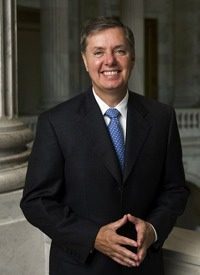
On Wednesday, July 22, South Carolina GOP Senator Lindsey Graham offered his support for the confirmation of U.S. Supreme Court nominee Sonia Sotomayor, who could become the nation’s first Hispanic Supreme Court Justice. He thus separated himself from the GOP’s more conservative element.
Sen. Graham became the fifth Republican to announce his intention to vote in favor of Sotomayor, now expected to be confirmed easily in early August. Graham told the Greenville News, “I think it’s appropriate to celebrate that the court has changed. This is an historic pick.”
Sen. Graham expressed no concern that this would alienate him from the GOP’s conservative base in South Carolina. Graham’s war chest (plus the fact that the Democratic nominee, Bob Conley, received almost no support from the state’s Democratic Party) won him an easy reelection last fall.
According to David Woodard, a political scientist at Clemson University who did consulting work for Sen. Graham back in the 1990s, “It’s $5 million to run against him in 2014.”
This means Sen. Graham can do pretty much as he pleases for the moment. Then, as 2014 approaches, he’ll have to act and talk a bit more conservative. According to Woodard, though, Sen. Graham will have the time to build up a war chest that will be sufficient to weather any challenge from within the GOP.
“My conservative record,” Sen. Graham said, “I’ll put it up against anybody’s.”
Sen. Graham, along with Sen. Edward Kennedy (D-Mass.) and Sen. John McCain (R-Ariz.), co-authored an immigration reform bill that was narrowly defeated in Congress in 2007 amidst one of the most extensive grass-roots opposition campaigns in history. Phone calls overwhelmed congressional switchboards and servers crashed, flooded with e-mails from millions of people who believed that immigration reform was code for amnesty for the (at least) 11 million illegal aliens living and working on U.S. soil.
Sen. Graham, at the state GOP convention in South Carolina, expressed open disdain for the “libertarians” in the Republican Party, referring to that substantial fraction of Republicans who continue in their support for Ron Paul, whose latest effort is a bill (HR 1207) proposing to audit the Federal Reserve.



